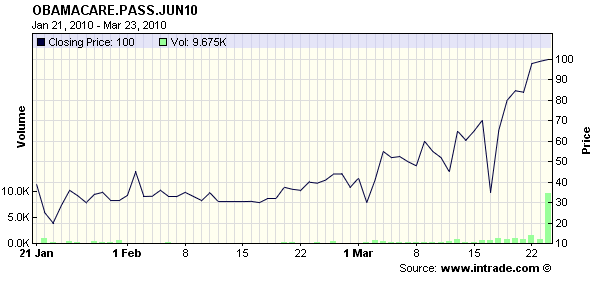The Market Wisdom Was Wrong on U.S. Healthcare?
Intrade is a “prediction marketplace“, which is a sort of alternate stock exchange attempting to leverage the ability of markets to rationalize information held by distributed individuals. The idea is to concentrate common sense and/or insider information into an emergent prediction, by letting people put money behind their guesses. There’s an assumption that people will bet money relative to their degree of certainty in a given prediction, thus correcting for haphazard speculation and (maybe) ideology. People argue back and forth about the effectiveness of prediction marketplaces, but it’s certainly a plausible sounding idea, for some kinds of predictions.
Intrade had a running trade on the U.S. health care bill passing by June.

The wisdom of the crowd was against the bill passing for the majority of the run, and as recently as three weeks ago. There wasn’t a clear consensus for passage until practically last week.
So what was it about the U.S. healthcare politics that confounded the prediction marketplace? Was it in fact wishful thinking from the sorts of people who are likely to participate in prediction markets? Were they wrong for the right reasons, and today’s bill-signing was actually a freak event? Was there something fundamentally abnormal about the political dynamics of this bill such that established heuristics failed people who thought they had a money-good grasp of what was going on?
I guess all of those hypotheses presume that the Intrade market has some track record of getting things more or less right. Has anyone checked? Paging Dr. Tetlock?